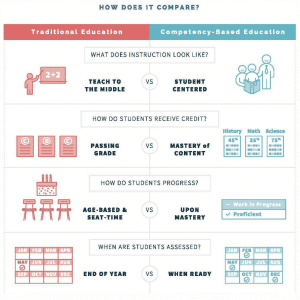What’s New in K-12 Competency Education?
CompetencyWorks Blog
CompetencyWorks in the News
Steps to Help Schools Transform to Competency-Based Learning, a Mind/Shift article by Katrina Schwartz, features Chris Sturgis and CompetencyWorks’ recent report: Implementing Competency Education in K-12 Systems: Insights from Local Leaders. A panel of district leaders implementing competency education presented a webinar on this report; you can find the archived webinar here.
School Designs
- The University of Texas Rio Grande Valley is opening a competency-based Middle School to Medical School program, which prepares motivated students to begin accelerating their careers on a pathway toward medical school.
- New Hampshire’s Sanborn High School has no letter grades; students can choose to take exams as often as they wish. Learning is measured through real-world projects on a flexible schedule. Learn more about Sanborn in this article titled, No grades, no problem: How one high school is transforming learning.
Competency Education Policy
- States considering policies to support competency-based education are on the rise, according to a recent iNACOL blog post. Policy levers that support competency education and personalized learning include innovation zones, school finance changes, planning grants, new assessment frameworks, and pilot programs. Read more here.
- Karla Phillips explores the question, “How will states finance the rapidly-changing face of education to be increasingly flexible, portable, and student-centered?” She discusses the states that recognize the need for a flexible school finance formula, such as Idaho, Utah and Georgia, which break the connection between seat time and funding.

Image Source: ExcelinEd’s 2014 Digital Learning Report Card.
- An Idaho state committee met for the first time in June to explore mastery-based education. The committee includes educators and administrators, and they are tasked with developing recommendations to the Idaho Department of Education, and they will assist with implementing twenty locally-controlled program “incubators” by the 2017-18 school year.
News, Blogs & Resources
- A report out of Mexico on competency-based education focuses on higher education, but applies more globally to concepts across K-12 and higher education.
- An article in The Atlantic suggests that MOOCs may be an effective way to reach and support educators as they build new skills and deeper knowledge of their disciplines. Chris Sturgis reflected on this idea in her recent post: Can MOOCs Become System Builders?
- Moving to a competency-based, blended learning education system can prepare citizens for the demands of the future workforce, according to a piece by Michael Horn.
- As competency education gains momentum and evolve, television stations are uniquely positioned to be partners and direct learning providers by developing content, forming strong community partnerships, and leveraging their unparalleled reach. Read more from the Association of Public Television Stations.
For more information and news in K-12 competency education, follow us on twitter (@CompetencyWorks), sign up for our monthly newsletter on our homepage, or visit our wiki.